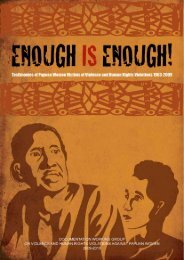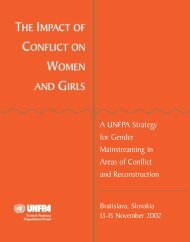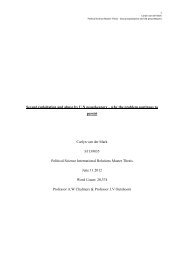IANSA [PDF, 2MB] - PeaceWomen
IANSA [PDF, 2MB] - PeaceWomen
IANSA [PDF, 2MB] - PeaceWomen
You also want an ePaper? Increase the reach of your titles
YUMPU automatically turns print PDFs into web optimized ePapers that Google loves.
Case Study<br />
Case 2: Crimes committed in the name of honour<br />
From Husseini, Rana, Murder in the Name of Honour, 2009<br />
In this case documented by Jordanian author Rana<br />
Husseini, a woman was shot dead by her brother<br />
when he found out that she had been raped and<br />
impregnated by a neighbour. This case shows how<br />
the use of firearms differs from other methods of<br />
killing and plays an important role in alleging that<br />
the crime was committed in a “state of fury”.<br />
Indeed, shooting can kill in a matter of seconds, as<br />
opposed to other means of killing, and the presence<br />
and use of guns makes intervention almost<br />
impossible. The use of a gun therefore makes it<br />
easier to argue that the crime was committed in a<br />
“moment of fury” and may help the perpetrator<br />
obtain a reduced sentence according to Article 98.<br />
In documenting the case, Husseini notes that the<br />
perpetrator had acquired the gun to fire in celebration<br />
for a wedding ceremony:<br />
“Mohammad was originally going to a wedding and<br />
had a gun put by for the occasion. Some Jordanian<br />
men like to celebrate weddings by firing live rounds<br />
from shotguns – though the practice is illegal and<br />
anyone caught is generally prosecuted.<br />
Mohammad raced back into the room with his gun.<br />
While her mother watched, Mohammad shot his<br />
younger sister. (...) Mohammad turned himself in,<br />
claiming that he had killed his sister to cleanse his<br />
family’s honour.” 44 Husseini later notes that<br />
Mohammad allegedly suffered from depression<br />
and had told his mother “he acted hastily after<br />
becoming enraged and it solved nothing.” 45<br />
Rana Husseini emphasises the way in which neighbours<br />
and family members, including the victim’s<br />
mother and sister, excuse this behaviour and find it<br />
justified, in upholding the family honour. Husseini<br />
reports that thanks to Article 98, the perpetrator<br />
was sentenced to only one year of imprisonment,<br />
and because his mother dropped the charges, he<br />
was free six months later.<br />
As opposed to other family members, Amneh’s<br />
younger sister Salma did not think the killing was<br />
justified, “There is no justice in this life. The neighbour<br />
who caused my sister to become pregnant is<br />
relaxed and alive and my sister is dead.” According<br />
to Husseini, Salma was taken out of school after<br />
the incident because her family was concerned<br />
about her reputation and they wanted her always<br />
to be within their sight.” 46<br />
Salma’s response highlights the issue of differing<br />
concepts of justice and notions of right and wrong.<br />
The case reveals that most community members<br />
do not view the male rapists and killers as the criminals<br />
but rather the young woman who is deemed<br />
to be the source of seduction.<br />
■ Challenges and Entry Points for Action<br />
Challenges<br />
According to the interviews, the main obstacles, which<br />
have prevented women from engaging with the issue of<br />
small arms control, is the lack of data available and the<br />
fact that women feel that the issue is viewed as being in<br />
competition with their attempts to secure women’s most<br />
basic rights.<br />
■ Still trying to promote basic rights<br />
The women interviewed stated that they had never<br />
worked on arms control before because they were still<br />
trying to protect and defend women’s basic rights. To<br />
them, arms control will be an issue to work on once<br />
some of the basics are secured:<br />
Entry points for action<br />
“The issue of guns is interesting but it’s ahead of what<br />
we’re doing. We’re still at the stage of CEDAW 48 , of<br />
obtaining a quota for women in parliament and working<br />
on broader issues such as basic rights, nationality law.<br />
The basics are not covered yet! So we are not ready to<br />
take on this issue.” – Interview, Arab Women’s<br />
Organisation, Amman, March 2011<br />
■ Lack of available official data<br />
State institutions do not have sex-disaggregated data on<br />
victims and perpetrators of gun-related crimes. None of<br />
the women’s shelters, hotlines and social workers working<br />
on violence against women, have integrated it in their<br />
work or asked victims if the perpetrator has access to a<br />
gun. However, all those interviewed agreed to begin<br />
working on the issue.<br />
In interviews, Jordanian women identified several opportunities to begin working on the issue in the Jordanian context.<br />
They also identified specific actions to take, which will be detailed in the Policy Recommendations section of<br />
the report.<br />
■ Jordanian government “desperate” to control civilian gun possession<br />
In January 2011, for the first time national legislation on<br />
the use of small arms was applied to a case of celebratory<br />
shooting. A man was sentenced to 5 years in prison<br />
for firing his gun in the air during a wedding celebration,<br />
injuring one person. In contrast to some of its neighbouring<br />
countries, Jordan is desperate to control civilian<br />
gun possession:<br />
“At all major events, weddings, births, men express their<br />
happiness through gunshots. It is a very primitive way of<br />
expression. The government would like to control this<br />
habit and would welcome any initiative on it.”<br />
– Interview, Arab Women Organisation, March 2011<br />
The willingness of the Jordanian government to control<br />
small arms presents the opportunity for women to take<br />
a leading role in strengthening gun control policies, and<br />
specifically to make them more gender-responsive. A<br />
potential focus would be to confiscate guns and revoke<br />
licences in cases of domestic violence and crimes committed<br />
in the name of honour.<br />
■ UN Security Council Resolution 1325 and SALW control: elaborating a National Action Plan<br />
“[UN Security Council Resolution] 1325 can be a strong mind, the action plan for 1325. I see ourselves in advocacy<br />
tool in acting on this issue. It could be an introduction, a<br />
and awareness-raising because we are a national<br />
base.” – Women’s Studies Centre, Jordan University, network.” – Arab Women’s Organisation, Focus Group<br />
Focus Group Session, Amman, May 2011<br />
Session, Amman, May 2011<br />
In both of these cases, firearms were the preferred<br />
instruments for committing crimes in the name of<br />
honour. As the element of surprise is crucial in determining<br />
whether the crime was committed in a fit of<br />
passion, firearms can be helpful in making this argument<br />
in court, as opposed to other methods of killing.<br />
The availability of small arms increases the danger<br />
faced by Jordanian women; in a fit of passion,<br />
because of a simple rumour, a male family member<br />
can become angry and kill them. Instead of leaving<br />
with bruises, these women will be dead, or disabled<br />
for life.<br />
What are the challenges that have prevented<br />
Jordanian women’s groups from engaging with the<br />
issue of small arms control? What entry points for<br />
action have Jordanian women identified?<br />
“I am interested in the topic [of small arms] because it is<br />
related to the issue of women’s security. According to<br />
Security Council Resolution 1325, women all over the<br />
world should be part of the movement. The resolution<br />
speaks about two things: participation in peace<br />
processes and prevention of armed conflict. If we want<br />
to tackle the issue of small arms, I think that the best<br />
approach is to consider 1325 as a basis. How can we<br />
help women and women NGOs, women’s activists to<br />
participate in the protection of women? If there is a<br />
space for us as women to do campaigns and advocacy<br />
to protect women, then I see myself in this. I have this in<br />
In a focus group held in May 2011 in Amman, women’s<br />
rights organisations pointed to UN Security Council<br />
Resolution 1325 as an entry point for action. They<br />
specifically expressed interest in developing a National<br />
Action Plan (NAP) on 1325 that would include recommendations<br />
on SALW control. Jordanian women independently<br />
came to the same conclusion that the <strong>IANSA</strong><br />
Women’s Network had come to before: links can and<br />
should be made between UNSCR 1325 and SALW control.<br />
49 These links have been made in the 1325 National<br />
Action Plans of several countries, including The<br />
Philippines, Uganda, Norway and Portugal. 50<br />
18 19


![IANSA [PDF, 2MB] - PeaceWomen](https://img.yumpu.com/25206379/10/500x640/iansa-pdf-2mb-peacewomen.jpg)

![Commitments Sample [PDF, 93KB] - PeaceWomen](https://img.yumpu.com/25206331/1/190x245/commitments-sample-pdf-93kb-peacewomen.jpg?quality=85)











![A Toolkit for Advocacy and Action [PDF, 260KB] - Peace Women](https://img.yumpu.com/25205989/1/190x245/a-toolkit-for-advocacy-and-action-pdf-260kb-peace-women.jpg?quality=85)